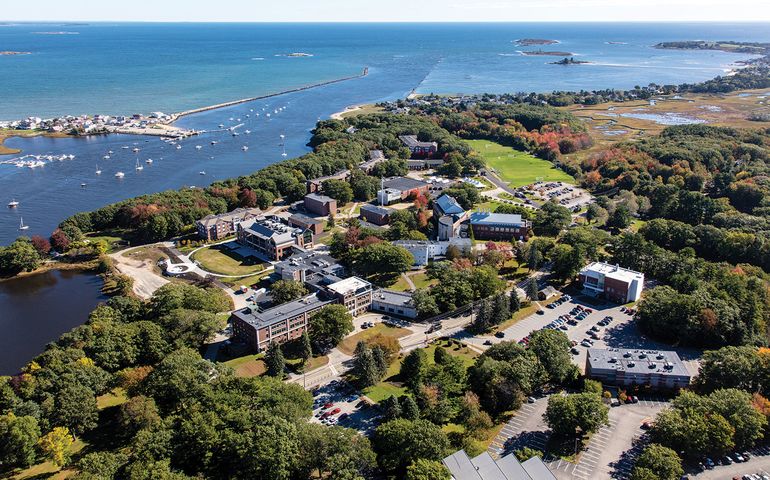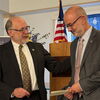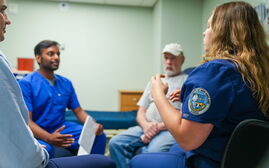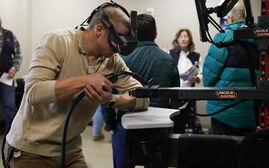Higher ed roundup: Three more Maine schools unveil plans for fall reopening
 Courtesy / University of New England
The University of New England has campuses in Biddeford, shown here from above, Portland and Tangier, Morocco.
Courtesy / University of New England
The University of New England has campuses in Biddeford, shown here from above, Portland and Tangier, Morocco.
Three more higher education institutions in Maine have unveiled plans for the upcoming fall semester amid the pandemic.
The University of New England and Maine Maritime Academy are planning campus reopenings, while Southern Maine Community College is preparing to hold most of its classes online in accordance with Maine Community College System guidelines.
All three are taking the cues from a framework laid out by the state's higher education leaders in early June. That model gives a preference to on-campus, in-person learning but allows for other responses to changing circumstances and contingencies.
UNE on Friday said it will resume on-campus operations and instruction in modified formats for the upcoming academic year, outlined in a plan called UNE Onward.
It will require all undergraduates to bring proof of a negative COVID-19 test taken within 72 hours of their arrival to campus. The school has also partnered with the Broad Institute in Cambridge, Mass., and MaineHealth’s NorDx Laboratories for required testing of students shortly after they arrive on campus.
The school said it is also taking measures to accommodate social distancing in classrooms, housing and dining, and has designated an area in one of its residence halls for any students infected with the virus to quarantine.
The university also said the plan will evolve as circumstances around the coronavirus pandemic change and in response to new guidance at the state and national level.
“While we have developed a robust strategy for safely welcoming students back to campus, we recognize that, as conditions evolve, our community cannot completely eliminate risks associated with the virus until an effective vaccine is available," said UNE President James Herbert in a news release. He added that the plan is "inherently flexible" and promised more updates this summer.
Maine Maritime Academy
At Maine Maritime Academy, a public college and nautical training institution in Castine, in-person courses are scheduled to start on Aug. 31, though some may be combined with online instruction and other courses will be conducted remotely.
“Our faculty and staff have been working tirelessly to develop ways in which we can deliver a rigorous academic experience for our students while also prioritizing the health and safety of our community given the ongoing threats posed by this pandemic,” the school's president, William J. Brennan,said in a news release.
He said the plans were built around four primary considerations: operating in the safest possible manner to manage physical spaces as the campus is occupied with people; holding classes and laboratories in a COVID-19 environment, including the use of remote instruction; addressing the impact and scheduling of summer programs, including annual training cruises and field experiences; and addressing changes in infrastructure to support education, including library services and tutoring.
Brennan said that while programs of study at Maine Maritime Academy derive value from hands-on learning, "we must still create the safest possible environment for our community; safety will be the foundation of all that we do.”
SMCC
Unlike the other two institutions, Southern Maine Community College said last week it will offer most of its fall semester classes online, with smaller numbers of in-person classes for academic programs that require hands-on learning.
With protective measures in place, SMCC will allow some students to take in-person, hands-on instruction in fields where it is essential. They include automotive technology, culinary arts, emergency medical services, HVAC/plumbing, nursing, precision machining, radiography, biological sciences and other select trade and health science programs.
“We are pleased to be offering a full schedule of classes to students this fall,” said SMCC President Joe Cassidy. “This approach prioritizes our commitment to the health and safety of our employees and students and our further commitment to delivering top-rate educational experiences for our students. Keeping our college both healthy and educationally vibrant is a goal we all share.”
SMCC, which offers courses at campuses in South Portland and Brunswick, transitioned to online classes in the spring semester. The school said it continues to offer online courses this summer and that it has upgraded its cloud-based learning management systems, added new tools for teaching and learning and provided enhanced training for faculty who are teaching remotely.
Maine Community College System
SMCC’s plans are in line with a framework outlined by the Maine Community College System for all seven institutions that seeks to balance the delivery of continuous, high-quality education with the need to protect the health and safety of their communities.
It calls for limiting in-person classes will be limited to courses where hands-on instruction and assessment is essential to developing the skills required of the program, while all courses that can be taught remotely will be delivered online.
“These measures allow us the most effective path for delivering and completing education and training our students desperately need in this economy, while upholding our commitment to protecting the health and safety of our students, employees, and the broader community,” said Maine Community College System President David Daigler in a news release.
He also said the plans need to account for the fact that about 95% of students commute between campus and their communities, many with jobs and families.
"We have taken prudent steps to minimize the threat of transmission of this highly communicable virus while affirming our commitment to delivering the skills our students need to compete in today’s economy,” he added.
The system, which employs about 1,600 people, serves more than 27,000 people each year through degree programs, customized training and credit and non-credit offerings.














0 Comments